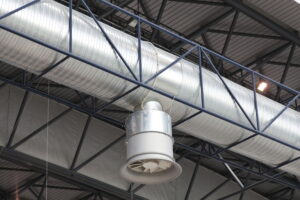Whatever type of heating system you use for your commercial facility (rooftop units, radiant heating systems, boilers, gas furnaces, etc.), you must also pay attention to your facility’s indoor air quality (IAQ). Unfortunately, indoor air quality is often low for commercial properties, especially during times when the heating system needs to run. To ensure the best efficiency for a commercial heating system, the facility needs to stay sealed from the outside, and this contributes to poor ventilation and lack of fresh air.
Poor indoor air quality creates multiple problems: health issues for occupants, lowered productivity for employees, damage to equipment (particularly electronics) and building materials, and even a drop in the value of the property.
What can you do to ensure the best IAQ for your commercial property while heating it? We’ll look at several actions you can take.
Schedule Regular Professional HVAC Maintenance
This service isn’t only important for indoor air quality; it’s essential to keep equipment running at peak efficiency with the fewest malfunctions and the longest service life possible. But right now we’re focused on air quality. A heating system with neglected maintenance will circulate dust, dirt, lint, and commercially produced pollutants around a facility. Routine HVAC maintenance from professionals cleans the equipment and changes filters to lower the heating system’s impact on IAQ. Maintenance technicians also inspect ducts and vents to see if they may adversely affect air quality.
Proper Ventilation
The importance of proper ventilation in a commercial space can’t be overstated. Lack of ventilation often leads to negative air pressure inside a building, which is when more air is vented out of the building than is brought into it. Negative air pressure leads to health problems and it also affects processes used in many commercial facilities. Make-up air units are one installation that can help correct this problem. You can also achieve better ventilation through other ventilation system installations (exhaust fans and air handling units) and improvements to ductwork.
Humidity Control
Dry air can lead to discomfort, while highly humid air will promote the growth of mold and mildew. You want to strike the ideal humidity balance for your commercial properties. (This balance varies depending on the space, but a standard balanced humidity is 45%). Installing humidifiers and dehumidifiers or having current ones inspected and repaired will help with this.
High-Efficiency Air Filters
If you don’t have high-efficiency filters installed into the HVAC system of your commercial property, we strongly recommend that you look into having this done. These filters capture minute particles, such as dust, pollen, and bacteria, stopping them from circulating through the air of a facility. You must have professionals select and install the filters so they won’t interfere with the regular operation of your heating and cooling system.
Work With the Experts
When it comes to your commercial heating in Waukegan, IL, and ensuring it doesn’t negatively affect indoor air quality for your business, always work with experienced professionals. We’ve helped commercial and industrial clients in Chicagoland since 1961—you can depend on us to find the solutions you need.

